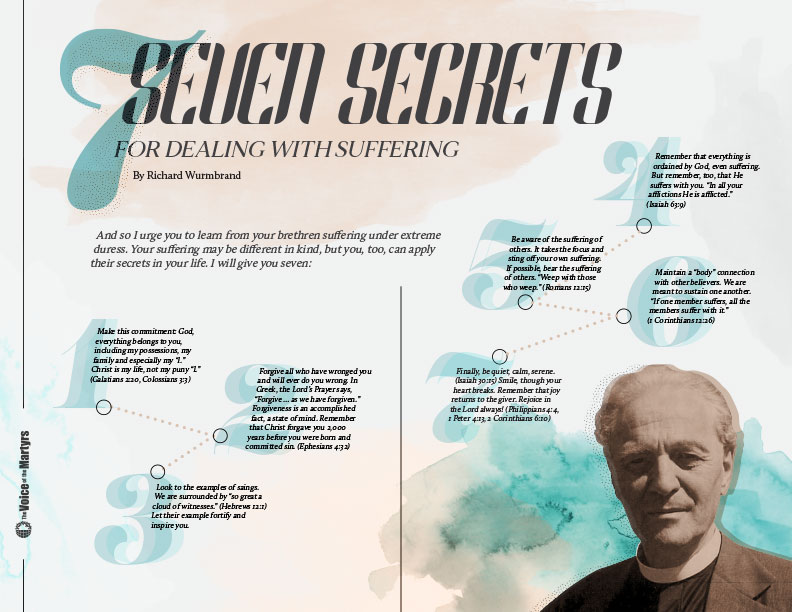Jesus promised “not peace but a sword” (Matthew 10:34), and ever since He uttered those words, committed Christians have been targeted relentlessly by pagan and religionist alike: crucified; burned at the stake; tortured on the rack; hunted in mountain passes, forests and caves; starved; beaten; brainwashed; tormented.
Only a devil could brew the consummate evil that has been meted out to Christ’s humble disciples over the centuries, reaching a horrendous climax in our own bloody era.
Is suffering, whether intended or circumstantial, a waste, or can it be redemptive? How should Christians respond? Jesus said, “Love your enemies” (Matthew 5:44) — but can you love the devil incarnate in another human being, evil personified?
I would like to propose that today’s Christians in repressive countries can provide a model for those of us in the free world.
Christians in the West often quote the text, “I can do all things through Christ who strengthens me” (Philippians 4:13), giving it a positive spin. But Paul had just said he had learned to endure all things — humiliation, hunger and want, as well as the satisfaction of his needs. Persecuted believers take Paul’s words as a promise that Christ will strengthen them to endure suffering, because they know a Christian can’t escape tribulation.
I think of a young girl of our Romanian underground church whose activities were discovered by the secret police. She had been guilty of secretly distributing Gospels and teaching children about Christ. To make her arrest as painful as possible, they decided to wait a few weeks for her wedding day.
When she was dressed for the event every woman looks forward to, the police suddenly broke in. Anticipating their intentions, she held out her hands, which they handcuffed roughly, looked lovingly at her groom, then kissed the chains, saying, “I thank my heavenly Bridegroom for this jewel He has presented to me on my marriage day. I thank Him that I am worthy to suffer for Him.”
She was dragged off to prison, leaving behind weeping Christians and a weeping bridegroom. Five years later she was released, haggard, broken, looking 30 years older. She had remained faithful. And her intended had waited for her.
A Soviet prisoner who was mocked unmercifully said, “Many fear suffering; in the past, I too feared. But the presence of the Lord in jail has given me so many happy experiences that I would not have changed them for years of easy living in freedom.”
How impressive is the prayer of a woman in a Siberian camp: “O God, accept all my sufferings, my tiredness, my humiliations, my tears, my nostalgia, my being hungry, my suffering with the cold, all the bitterness accumulated in my soul. … Dear Lord, have pity also on those who persecute and torture us day and night. Grant them, too, the divine grace of knowing the sweetness and happiness of Your love.”
How do the persecuted view their torturers, who often take fiendish delight in inflicting maximum pain? Many are able to look at them with love, knowing that without Christ they are eternally lost. Believers exemplify what Jesus preached:
“Love your enemies … pray for those who spitefully use you and persecute you.” And they practiced what He taught: “Father forgive them, for they know not what they do.”
Once when I was in prison, a pastor was thrown into our cell. He had been horribly beaten and was covered with blood. Some prisoners cursed the communists. Half dead, groaning in pain, he said, “Please don’t curse them. Be quiet! I want to pray for them.”
Do Christians ever resent their sufferings and blame God? I would be dishonest if I didn’t admit that there were moments of doubt and that under extreme pressures some became Judases. May God have mercy on their ravaged souls!
Once I was in the same cell with a man I had brought to Christ. He left behind a wife and six starving children. I asked him, “Have you any resentment toward me for bringing you to Christ and for the fact that your family is in such misery?”
His reply typifies the attitude of so many martyrs down through the centuries: “I have no words to express my thankfulness that you have brought me to the wonderful Savior. I would not have it any other way!”
In Ukraine, the Christian Terelya was put in a psychiatric asylum. The sadistic psychiatrist Butkevitch told him, “The fact that you call yourself a Christian shows already you have a serious and irremediable sickness. Faith in God is mass psychosis, a kind of schizophrenia.”
But instead of brooding about his suffering, Terelya brought officers of the secret police to Christ. They provided him with paper and pencil and smuggled out a whole notebook of his with joyous poems praising God.
Out of the mire of suffering grows the lily of joy in the Lord.
